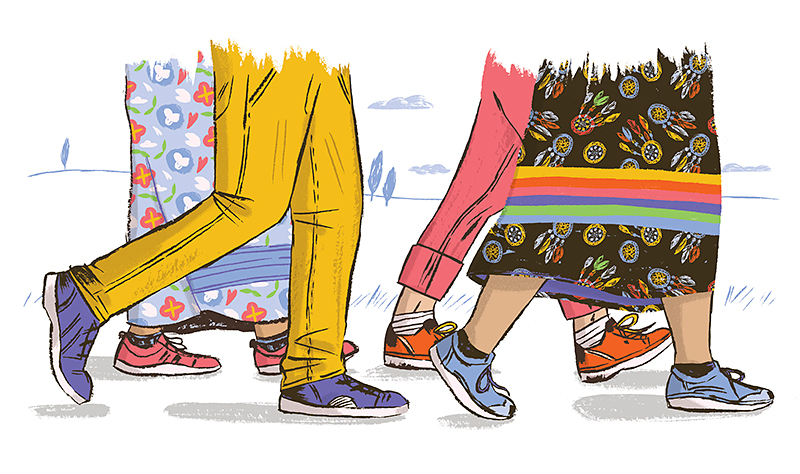When the COVID-19 pandemic hit, my daughter and six-year-old grandson, Atayoh, moved back to Saddle Lake Cree Nation so we could support each other. As safety precautions eased, we put Atayoh in soccer and swimming camps.
As I walked into the local pool to register him, I was transported back to the time when my children, Janice Makokis, ’05 BA(NativeStu), and James Makokis, ’04 BSc(Nutr/Food), were competitive swimmers. I remembered the many times my husband and I volunteered at swim meets and the excitement of watching our children compete.
But I realized I also had a terrible feeling in the pit of my stomach. I felt worry for my grandson.
Atayoh knows he looks different. He has long braids and he’s brown, and for some reason his appearance causes people to stare and sometimes even ask if he’s a boy or a girl. So, when I went to the pool that day, I found myself trying to soften the blow by explaining to the receptionist that my grandson is a traditional Cree boy with long, beautiful braids.
One day, as I sat watching Atayoh swim, I struck up a conversation with a young woman next to me. It turns out her younger brother was in the same Grade 5 class as my son 28 years ago. Talking to her sparked a memory of an incident at a school Christmas concert, when this young woman’s brother told James he was black, he didn’t belong and he “should burn.” When my husband and I spoke to our son’s teacher and the school administrator, they minimized the incident. We were told, essentially, to shrug it off. Get over it and move on. End of story.
Why am I sharing this memory? Because here we are in 2020—and what has changed? Not enough. For four generations, my family has experienced racism and it’s painful. As Atayoh’s kokum (grandmother), it will break my heart to see him experience the pain we’ve all had to endure.
As a young mom, I was so busy working, raising my children, being involved in their education and in their sports activities that I dealt with racism on the fly. Now, I feel a sense of urgency to create change for the sake of my grandson.
I remain optimistic. If we work together, if we do the intellectual and emotional work that’s needed to counter racism, our grandchildren and those yet to be born will inherit a better world.
About a year ago, I participated with Indigenous and non-Indigenous allies in a two-week treaty education walk from Edmonton to Calgary. The mission was to educate other potential allies about the numbered treaties. We walked and talked all the way to Calgary. We stayed in church basements en route, and every night we watched a short film, Treaty Talk: Sharing the River of Life, followed by talking circles with residents from each community. We shared many tears and heartfelt stories over the two weeks.
One night, a white man in his 70s said: “I am here to unlearn what I learned as a young person and to learn about Indigenous Peoples from Indigenous Peoples.” His words gave me hope. The hope I have for all of us. At his age he is still open to learning. None of us learned the true Indigenous world view in school, and we have all lost out as a result. We have lost out on opportunities to really know one another, to learn from the horrific stories of colonial history, to hear about Indigenous resilience despite ongoing racism and, most importantly, how we can all move toward making reconciliation more than an empty word.
It takes what I call “heart work.” We are all called to do this work. It involves confronting difficult questions. It requires that we recognize and address racism head-on with honest, positive and respectful conversations.
And as we do this work, I will continue to love and laugh and wear my rose-coloured glasses that foresee a brighter future.

We at New Trail welcome your comments. Robust debate and criticism are encouraged, provided it is respectful. We reserve the right to reject comments, images or links that attack ethnicity, nationality, religion, gender or sexual orientation; that include offensive language, threats, spam; are fraudulent or defamatory; infringe on copyright or trademarks; and that just generally aren’t very nice. Discussion is monitored and violation of these guidelines will result in comments being disabled.